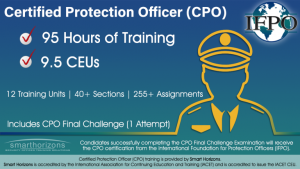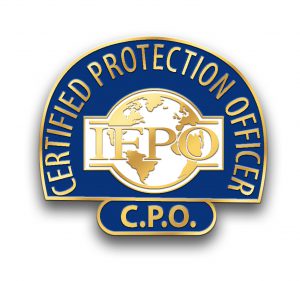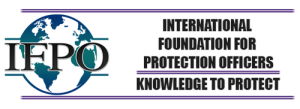By Dan Mendelson (edited by Ted Czech)
What’s in a name? Everything, if your mission is to raise the branding profile of the security industry.
Guards are called protection officers (or security officers) by the International Foundation for Protection Officers (IFPO), and for good reason. The term guard does little to command respect or convey professionalism to the public who encounter them on a daily basis.
“There’s a shadow cast upon the whole industry due to the misconception surrounding guards,” IFPO Executive Director Sandi Davies. “In truth, these hard-working, highly-trained men and women are our first responders who have a wide range of skills.”
The IFPO’s main weapons in the fight against the stereotype are training and education, tools that have made it a leading security educational institution and an authoritative voice in the field.
The not-for-profit membership organization has provided professional development opportunities to many of the country’s protection officers, with over 80,000 protection officers gaining some level of certification through IFPO programs.
These officers represent a mix of proprietary and contract employees working in industries that include hospitals, campuses, nuclear facilities, cultural properties and gaming. Businesses that employ what is known as Certified Protection Officers (CPO) are diverse: Dow Chemical, AFLAC, American Red Cross, Ralph Lauren, Ohio State University and the United States Marine Corps have all hired officers who went through the rigors of IFPO certification programs.
Certification: Gateway to a Higher Standard
More businesses are requiring proof of training these days, a result of a threat landscape that is increasingly sophisticated and global.
“It’s the biggest change I’ve seen,” Davies noted about the demand. As a third party, the IFPO is an authority that can validate whether or not those officers have proper training. “Businesses that contract out are writing into the bid specifications that there is a requirement of an IFPO certification for new hires.”
IFPO offers several types of certifications. The Certified Protection Officer (CPO) training course is the organization’s premier program. It is considered a basic course that is designed for the career-minded security professional. But make no mistake: it is by no means entry level; you must complete 80 hours of training and pass a final exam before achieving CPO designation.
Delivered primarily online or as a correspondence course, units of study include over 40 subject matters a partial list might include crisis
intervention, physical security, hazmat, and workplace violence. And officers must re-certify every two years in order to maintain CPO certification.
“The requirement assures employers that you’re staying current with emerging trends, and is proof of your knowledge base,” Davies added.
The designation is a proven door opener: CPO’s are viewed as more qualified and better equipped than officers who just stepped out of an employment agency, and are often hired for supervisory positions in a variety of settings.
_______________________________________________________________________________________________________
Get certified and take your security career to the next level!
The International Foundation for Protection Officers (IFPO) is dedicated to providing meaningful and cost effective security training for security guards and protection officers.
We believe that education is a necessary and essential part of professional security training and the security officer’s background. IFPO serves individuals, security companies, and organizations that have their own private security staff. Our students and members benefit from the recognition and standing that the prestigious IFPO certification conveys.
LIKE and FOLLOW the IFPO on Facebook!
International Foundation for Protection Officers Mission Statement
Mission Statement Part I.
The International Foundation for Protection Officers provides professional learning opportunities for security practitioners, to impart the knowledge, skills, and competencies required to maximize job performance and enhance career potential.
Purpose: to make a positive difference in the quality of the participant’s job performance and elevate the professional status of students who partake of our learning opportunities.
Business: to supply committed security practitioners with a quality education to help achieve their highest potential and provide recognized accreditation for successful completion of educational goals.
Values: commitment, integrity, responsibility, and standards of excellence, provide the platform that supports our journey as we pursue our mission.
Vision Statement
Commitment to Excellence: To be the recognized center of excellence and primary provider of education and training products and services to the security industry.
Mission Statement Part II.
“The International Foundation for Protection Officers is committed to the support and professional development of protection officers and supervisors. Through advocacy, promoting training standards, and providing accessible training, education and certification opportunities, we seek to enhance their professional standing as well as increase and diversify the value of the vital services they provide.”




